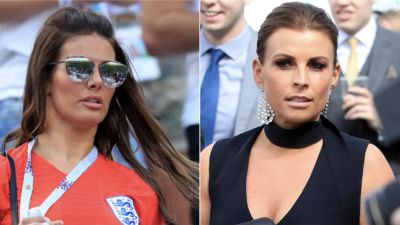'Wagatha Christie': Rebekah Vardy claims partial victory as judge throws out part of Coleen Rooney's defence

Rebekah Vardy has claimed a partial victory in the "Wagatha Christie" libel battle after a High Court judge threw out part of Coleen Rooney's defence.
The long-running argument saw Ms Rooney, 35, accuse Ms Vardy, 39, of leaking "false stories" about her private life to the press in October 2019 after carrying out a months-long "sting operation" which went viral across the world but has now descended into a protracted libel case.
The wife of former England star Wayne Rooney publicly claimed her fellow footballer’s wife shared fake stories she had posted on her personal Instagram account with The Sun.
Ms Vardy, who is married to Leicester City striker Jamie Vardy, denies the accusations and is suing Mrs Rooney for libel.
On Wednesday, Ms Justice Steyn threw out parts of Ms Rooney’s defence but kept some aspects that Ms Vardy had applied to strike out.
The judge dismissed a claim by Ms Rooney that her fellow footballer’s wife showed "publicity-seeking behaviour" when sitting behind Ms Rooney in someone else’s seat at the 2016 Euros.
Ms Justice Steyn found that even assuming the allegation was true, it would still not help Ms Rooney’s case.
She said: "The fact that a person seeks media coverage of their own attendance at a football match does not make it more probable that they would disclose private information about another person to the press."
The judge said the argument was irrelevant, adding "it would be a waste of time and resources" for the claim to continue.
Ms Justice Steyn also threw out an allegation that Ms Vardy was leaking about the libel case itself to The Sun.
The judge further dismissed part of Ms Rooney’s defence about how Ms Vardy had written a statement for the press regulator IPSO after a complaint was made about The Sun.
However, Ms Justice Steyn said the alleged close relationship between Ms Vardy and the newspaper was "one of the building blocks" of Ms Rooney’s inferential case.
She said: "I accept that an exceptionally close relationship between the claimant and the newspaper or journalists to whom the defendant’s posts are alleged to have been disclosed is probative of the plea of truth, albeit on its own it would not take the defendant far."
She continued: "It can, at least, be said to be less likely that a person with no such relationship would regularly disclose private information about others to that newspaper or those journalists and, perhaps, less likely that the disclosure would, on its own, result in a published article."
The judge also refused to throw out Ms Vardy's claims that her alleged - but denied – authorship of "The Secret Wag" column, was not relevant to the trial.
Ms Justice Steyn found that the short-lived column was relevant to the case, continuing: “While these paragraphs do not go to the core issues, the allegation that the claimant had, or was the primary source for, a gossip column about professional footballers and their partners in The Sun is logically probative similar fact evidence.”
The judge also refused to throw out other parts of Ms Rooney’s defence about Ms Vardy’s alleged close relationship with The Sun and its journalists, including how she interacted with some on social media and positive coverage she allegedly received for leaking stories.